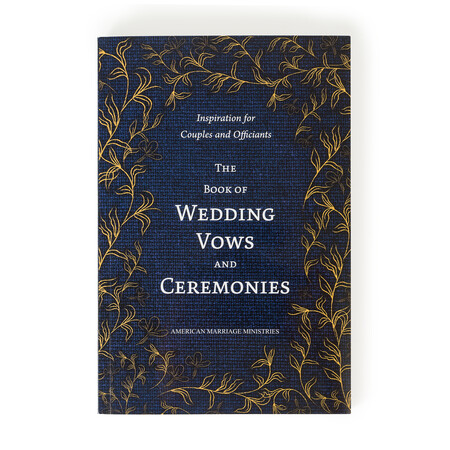Your alarm clock rings, but you're already awake, seated in deep meditation. You're so calm and balanced that your mind is a pristine, spacious void with wedding bells gently ringing in the distance. The bells become louder, the tone grows sharper and more intrusive. You open your eyes, and your phone is ringing. It's the bride calling…
“[Insert officiant's name], Oh my God, I'm so glad you finally picked up. It's [insert groom's name], he's freaking out about saying his vows in front of a crowd. He's in the bathroom taking a cold shower and listening to Allstar by Smashmouth, on repeat!”
You take a deep breath. You pause, giving yourself and [Insert officiant's name] a moment to just take it all in. You're an ordained minister with American Marriage Ministries. You've read the training materials, working with the couple, you implemented the tried-and-true guidance of AMM's bestselling officiating a wedding book, Asked to Officiate. When it comes to officiating a wedding, you're about as ready as they make them, so you let the moment of silence last a few more seconds and then you respond.
“Your ceremony is going to be like a journey, where the officiant is the pilot, and you're sitting up in first class with everything taken care of. When you've got a good pilot and a well built airplane, it's easy to relax and just let things unfold. Heck, you can even have fun!”
You can hear [insert bride's name] breath slowing down as she relaxes. She thanks you, hangs up, and goes back into the bathroom. By the time everyone is gathered for the ceremony, the couple are relaxed and happy. But you're not taking chances, you have them smile and hold each other's hands during the ceremony (that's guaranteed to calm them down), you tell a hilarious-yet-appropriate joke that makes everyone feel connected and happy, and you've got some breathing exercises up your sleeve just in case.
If you're officiating a wedding and want your day to go like this when unexpected turbulence arises, then this section of our training program is for you! Keep reading to learn how the pros handle the unexpected, and how you can officiate great ceremonies no matter what happens!

How to lead the ceremony with conviction and confidence
The wedding officiant's role is more than leading the ceremony and signing the marriage documents. The wedding officiant embodies the pomp and circumstance of the ceremony, they enact the legal and social aspects of the day, and they are front-and-center as the couple promise themselves to each other in marriage.
So how do you embody all these awesome qualities?
It's all about preparation, and being your best self (which is pretty awesome, which is why the couple asked you to officiate their wedding). As the bridal party enters and silence falls, all eyes will be on you, and we're gonna make sure the you they see is loving what he or she is doing! Whether you start with solemn words or a playful touch, setting the right tone is essential.
Your energy as the officiant sets and maintains the ceremony's tone. Even if the couple is shy, your energy keeps the audience attentive. As you officiate the wedding, avoid being monotone and glued to your script. Dr. Maya Angelou once said, "People will forget what you said, people will forget what you did, but people will never forget how you made them feel." Emotions leave lasting impressions, so familiarize yourself with the script to focus on delivery rather than reading.
The way to do this is to discuss the desired tone with the couple in advance, and then embody that vibe during the ceremony. If you know the material forward and back, it's easy to just be who you are and let that energy flow. You'll see. It's actually fun!
But as the authority figure, you must remain composed. Keep a positive attitude and stay focused on your responsibilities, even if emotions are running high. Smile, it's contagious. Make eye contact to reassure the couple and connect with guests. Take a pause every now and then, ceremonies go by fast, you don't need to move quickly. During the ceremony, look among the guests or over their heads to create dramatic pauses. Take your time and don't rush. You got this.

Calming a Nervous Bride or Groom during the ceremony
We recently worked with a couple who expressed upfront: they expected to be very nervous at their ceremony, and asked what the officiant could do to help them calm down. Before officiating a wedding, this is not an uncommon question. Lot's of couples experience this, trust us, it's totally normal. Weddings are emotional and there will be plenty of nervousness to go around. This part of your training will give you practical advice on how to respond to a case of nerves.
As a wedding officiant, projecting responsibility is key to ensuring the ceremony runs smoothly. This begins with punctuality. Arriving on time or early on the wedding day is essential. Take a few minutes to speak with the couple, reassuring them that everything is under control. This will ease their minds, allowing them to focus on the joy of their special day.
Take a Deep Breath: Encourage the couple to look at each other and take a deep breath or two at the start of the ceremony. This simple suggestion helps center them and calm their nerves. The perfect time for this is after the bridal party has taken their places and the couple steps forward. This can be as easy as saying quietly to them when you are up there, “ok guys, let's all just close our eyes and take three deep breaths together…”
Face Each Other and Hold Hands: Suggest that the couple face each other and hold hands during the ceremony. This physical connection provides a calming effect. They know and trust each other, it's a physical thing. But if doing this makes them more nervous, it's okay for them to look at you instead. The key is to give them something tangible to do that assures them that they will be just fine up there.
Let the Officiant Handle the Ceremony: Remind the couple that you got this. While they may have written and coordinated the ceremony with you, they should let you take charge during the event. Encourage them to be in the oment rather than worrying about what comes next.
Your role includes welcoming everyone, introducing readings, guiding rituals, and leading the ceremony from start to finish. Assure the couple that you have everything under control. You're the officiant, it's your job! This allows them to relax and enjoy (or survive) the experience.
Add Humor: If you can feel the couple becoming nervous or emotional, consider starting the ceremony with a lighthearted joke to lift the energy. This can help everyone, including the audience, relax. We all respond to each other's energy, so if you can shift everyone to a higher vibration, you're going to change the rest of the day.
Don't forget to take care of yourself too. If you're newly ordained and about to perform your first ceremony, it's natural to feel nervous. Even experienced officiants get the jitters. Preparation and punctuality are not just for the couple; they're for you too. By preparing and taking your duties seriously, you'll gain confidence and help those around you feel at ease. So, relax, you'll do great!

Handling a ceremony mistake in the moment
It happens to the best of us… sooner or later. If you officiate enough wedding ceremonies, you're gonna make a goof. It may be a missed word, an incorrect pronunciation, losing your place in the ceremony; maybe it's an outside distraction that's not your fault! Don't worry and don't dwell on the past - it's not the goof that matters, it's how you handle it.
In high-pressure situations like officiating a wedding ceremony, keeping your cool can be challenging. If you make a mistake, it's easy for your mind to start racing. Familiarity with the script is crucial. Take the time to read it from beginning to end multiple times (but don't memorize it). As you are officiating the ceremony, focus on the words you need to say next and your pace. By staying calm and moving through the script in a dignified manner (use those long Barack Obama pauses), you can avoid making unnecessary errors.
If you find yourself shaken, use a natural breakpoint in the ceremony to center yourself. Here's how you do that: finish your sentence, pause for a deep breath, and then continue when you're feeling good again. Ceremonies aren't a speed reading contest; guests expect pauses. In fact, these pauses allow folks in the audience to appreciate the couple, the venue, and the overall energy of the experience. If you handle it well, guests won't even notice that you flubbed, because they will be so deep in the experience.
Made a mistake? Just keep going. If you miss a word or say something incorrectly, don't overthink it. And if your mistake is really noticeable, or changes the meaning of your words, just say, “whoops,” back up, and repeat what you said correctly. Remember, no one speaks with perfect grammar, and you're likely the only one who noticed the error. Don't draw attention to minor slip-ups.
If you make an obvious error, or if the ceremony is interrupted by something outside of your control (barking dogs, crying babies, loud aircraft overhead etc.), move on quickly. Your goal is to make distractions minor footnotes rather than defining moments of the ceremony. If you miss a paragraph, you can just bring it back in later. If you jumble a sentence, you can re-read it. Avoid directly acknowledging the interruption unless absolutely necessary.
Putting it all together (some general advice on how to deal with nerves)
Ok, so now you know how to respond in the moment, and we're confident that the ceremony you are planning is going to be a hit, but just to make sure we've added some additional tips for being an awesome and confident officiant when you're officiating a ceremony (and a calm happy couple).
- Be Prepared: Practice your script until you know it well. Multip rehearsals will build your confidence and enhance your performance.
- Eat Sensibly: On the day of the wedding ceremony, limit caffeine and sugar. Eat a balanced meal (think fresh vegetables, healthy protein like tofu or salmon) a few hours before to maintain your energy and stave off the munchies.
- Focus on the Audience: This ain't really about you. Shift your attention from the you that is experiencing the fear, to the guests who are enjoying the ride. Visualize the wedding guests laughing and even tearing up, and imagine yourself feeling good about your performance.
- Stay Positive: Avoid dwelling on potential mistakes. Happiness is an inside job. If you're cultivating high energies, and not welcoming fear, that's how you're going to feel. So much had to go right to get you to this point, so don't worry, the universe has your back!
- Control Self-Doubt: Kinda the same thing, but it's worth saying twice. Don't hold space for thoughts that generate self-doubt. Repeat this mantra: “This is perfect…” a few times when you feel that feeling arise.
- Relaxation Techniques: Practice just watching your breath. Sounds simple, but it works. Just focus on where you are experiencing the in and out. A daily meditation practice also can make a huge difference in just a few days. We're also big fans of Wim Hof breathwork. Find what works for you and see where it takes you!
- Physical Activity: Ease anxiety by taking a walk, jumping up and down, or shaking out your muscles before officiating the wedding ceremony. Noise is also great, find a place to yell a bit, stretch out your jaw… you name it!
- Engage with the Audience: Create a positive feedback loop with your friends in the audience. Make eye contact, and smile, then notice the smiles shining back at you.
- Be Yourself: The couple asked you to officiate for a reason. Be yourself and let your good energy shine through.
- Maintain a Healthy Lifestyle: Maybe lay off the partying for a few days before officiating the wedding. Exercise, diet, sleep, yada yada…
As you can see there's no shortage of tools in your good vibes toolbox, so try one or two out and find one that gets the results you want.
So why do couples get nervous before their wedding day?
As an officiant, (or a nervous couple) it's worth unpacking this question a bit, because knowledge is power, and that includes power over our fears. We want to stress that this section is only presented here to give you a theoretical understanding that helps you grow as an officiant or couple. If you're feeling good, then you might want to just hold onto that feeling. The last thing we want to do at this point is give you more things to worry about, so keep that in mind as you read on.
Ok, so you're still reading. Those bad vibes we're talking about here stem from a combination of emotional, psychological, and practical factors. The emotional significance of a wedding is huge, and couples feel it. Heck, they carry it around with them sometimes. The ceremony marks a significant milestone in a couple's life, and for most couples, just participating in a ceremony is something that is new and scary.
The weight of this decision naturally leads to some pretty intense nerves. Additionally, there are those self-imposed expectations, as well as pressure from their families. The desire for everything to go perfectly and keep both mom and mom-in-law happy at the same time can create some pretty intense pressure.
Weddings involve stepping into the unknown. For most couples, there's that unknowable aspect of being married, and while they are excited about it (mostly), they just don't know what's around the corner. This uncertainty about how the day will unfold, and how they will feel during such a major event can be scary.
We've covered this a lot in this training, but it's worth repeating here: public speaking can set people off; reciting vows or making speeches in front of wedding guests can be intimidating. Plus, guests and wedding party members are concerned about looking their best. We've all had a wardrobe malfunction, but this ain't the time or place, so be gracious with yourself.
Practical concerns add another layer of stress. Weddings involve some serious planning and coordination. It's normal for couples to worry about how it's all going to unfold—timing, vendors, weather, etc.— that stuff can be stressful.
And oh boy, we haven't even seen the final price tag yet! Financial stress is also a factor. Weddings can be expensive, and if you thought buying a car was stressful, wait till you learn about everything that goes into a full-blown wedding where the costs quickly reach into the tens-of-thousands of dollars.
Now let's take a look at family dynamics. Is the couple trying to figure out how to keep the liberal cousins away from the conservative grandparents? Is the open bar going to turn into a political debate? Weddings often bring together diverse groups of people, including family members who don't get along. The potential for these kinds of conflicts can keep even the most chill couple up at night.
We get it, this is the world we live in. Here at AMM, we believe that love unites us all, regardless of who we voted for, and weddings should bring us together, but that's not always how it plays out in real life.
To manage these pre-wedding nerves triggered by these factors, here's our advice. Most of the tips in the training above can be applied here as well. Worried about a political clash at the watering hole? Do this: embody love and unity, meditate on these energies, and hold them close. If something happens, and you're in the right headspace, it's all going to work out.
Open communication with each other and your family and friends can prevent conflict and ease emotional and psychological stress. We're going to say it again: be present, be centered, take care of yourself, exercise, and eat healthy. Our body and mind are connected, and taking care in whichever ways we can will make a huge difference. Plus, it's your wedding, and that's awesome and a reason for happiness! That's where your focus should lie.

















